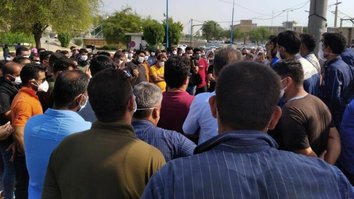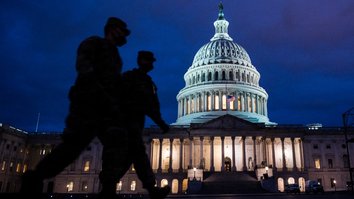TEHRAN -- Iran's president warned Monday (January 27) of threats to the Islamic republic's "democracy and national sovereignty", after a body dominated by his ultra-conservative rivals disqualified thousands of candidates, weeks before elections.
President Hassan Rouhani's moderate conservatives and their reformist allies are locked in a public quarrel with the Guardian Council over the disqualification of thousands of candidates -- including 92 sitting MPs.
The council, which oversees Iran's elections, says it has barred some 9,500 potential candidates from standing, almost two thirds of the 14,500 hopefuls.
Rouhani said the disqualifications risked appointments being made "elsewhere" other than the ballot box.
"The greatest danger for democracy and national sovereignty is the day when elections become a formality," the president's website quoted Rouhani as saying in a meeting with provincial governors.
"May God never bring this day," he added.
"Let us reassure the people and tell them our system is not a single-party system."
In a reference to ultra-conservatives, he said "they should at least let there be competition and participation".
He called on Iranians of all stripes to vote, "even if... there are shortcomings in elections".
"Sometime I may not want to vote for some reason, but some other time I may not have enough trust to go to the ballot box; this is very dangerous," he said.
Growing unrest
The polls come after a traumatic month for Iran in which anti-government protests swelled after the country's Islamic Revolutionary Guard Corps (IRGC) admitted to shooting down a Ukrainian passenger airliner.
That admission, and knowledge that the IRGC and top Iranian officials lied about the event in an attempted cover-up, set in motion renewed public outrage and unprecedented protests throughout the country.
Faced with an increasingly disaffected population and a plummeting economy, Iranian leaders are scrambling to maintain control while at the same time posturing to appear tough against the West.
While the latest demonstrations were sparked by Iran's downing of the airliner and the perceived incompetence of Iranian leaders in managing the incident, there is an undercurrent of rage directed at Iran's persistent economic woes.
These economic troubles and the internal unrest caused by them may be tempering the Iranian regime's willingness to confront the West in the latest showdown.
In the latest show of this unrest, a commander of the Basij militia -- an outfit closely aligned with the IRGC -- was shot dead on January 22 by unidentified assailants in Khuzestan Province.

![Iranian President Hassan Rouhani on January 27 issues a blistering criticism of the Guardian Council, a body of ultra-conservatives that controls the country's elections. [Iranian president's office]](/cnmi_st/images/2020/01/27/22159-rouhani-585_329.jpg)







After North Korea, Iran is the most dictator country in the world. All the countries should impose economic sanctions on Iran.
Reply1 Comment